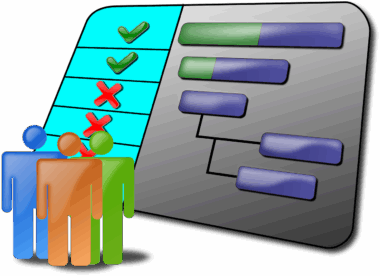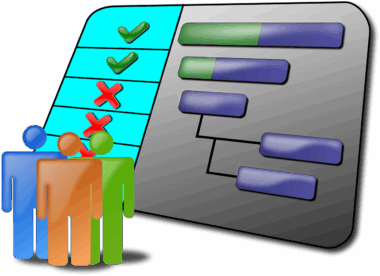The Role of Mobile Project Scheduling Software in Business Productivity
In today’s fast-paced business environment, having the right tools is crucial. Mobile project scheduling software has emerged as an effective solution, aimed at enhancing productivity. By facilitating task management, these applications enable teams to collaborate efficiently. This flexibility allows users to edit schedules in real-time, no matter their location. Moreover, team members can receive instant updates, keeping everyone informed and engaged. This immediacy helps in avoiding miscommunication, which often leads to delays, helping teams stay on track with deadlines. The visualization of tasks in real-time is incredibly helpful for managers. They can assess workloads and reassign responsibilities swiftly. This software enhances accountability within teams, as everyone can see each other’s contributions and timelines. With mobile capabilities, the entire team can access necessary documents and schedules right at their fingertips. This promotes a culture of transparency and increases overall satisfaction. Furthermore, cloud integration plays a vital role in providing access to important information at any time. Therefore, embracing mobile project scheduling tools can lead to significant improvements in business productivity.
Project scheduling directly impacts the allocation of resources within a business. Mobile project scheduling software not only organizes staff schedules but also improves the management of resources. By using these tools, businesses can allocate resources more effectively, avoiding overallocation or conflicts. This means ensuring that team members have the right workload, preventing burnout. When projects are scheduled efficiently, teams can maintain optimal performance levels. These tools often come with features like automated notifications, which alert team members about upcoming tasks. Such reminders eliminate the need for constant check-ins, allowing managers to focus on strategic objectives. Additionally, enhanced reporting features provide insights into productivity levels, enabling businesses to identify areas for improvement. Tracking progress becomes simpler, fostering a culture of continuous feedback and improvement. This data-driven approach helps in making informed decisions, steering the project towards success. Furthermore, businesses experience fewer delays and setbacks due to better planning. As a result, organizational efficiency increases significantly. When employees feel their time is valued through effective scheduling, morale rises, which is a key factor in enhancing overall productivity.
Enhancing Collaboration Through Mobile Solutions
Mobile project scheduling software also serves as a catalyst for enhanced collaboration within teams. By providing a centralized platform for communication, these tools unite teams under a common goal. Team members can effortlessly share updates and documents, fostering a sense of community and teamwork. The ability to see who is working on what encourages collaboration, allowing for seamless transitions between tasks. Moreover, mobile access means that team members can contribute on-the-go, adapting to various work environments and schedules. This flexibility is particularly beneficial for remote and hybrid teams, which have become increasingly common. With an integrated chat feature, discussions can happen within the application, reducing reliance on emails. This accelerates decision-making processes and helps resolve issues quickly. Moreover, visual tools like Gantt charts improve understanding by showcasing the timeline of tasks and dependencies. This visual representation enables better scheduling and prioritization strategies. As a result, teams can quickly adjust their efforts, allowing them to pivot and adapt to changes that arise during a project. Ultimately, this leads to higher productivity levels, as communication and collaboration are streamlined effectively.
Tracking project progress is another critical function of mobile project scheduling software. Businesses can monitor the pace of work through features that provide real-time updates. Managers can set milestones and gauge each team member’s contributions toward these objectives. This tracking assists in preemptively identifying potential issues that may arise, allowing teams to address them before they escalate. This proactive approach minimizes disruptions, ensuring projects maintain their momentum. When tasks are tracked efficiently, businesses can also assess their productivity levels and resource allocation. Furthermore, the data compiled can be used for future project planning and analysis. The ability to measure progress against set deadlines adds a layer of accountability that drives teams to meet expectations. Additionally, mobile project scheduling software simplifies the reporting process. Customizable reports provide insights into productivity, timelines, and individual contributions, which can be shared with stakeholders. Access to such data fosters informed decision-making, enabling quick adjustments to maintain project efficiency. Consequently, businesses that utilize these tools realize an increase in their overall operational performance, enhancing their productivity and profitability.
Accessibility and Usability Improvements
One of the standout features of mobile project scheduling software is its accessibility. Users can access these applications from various devices, including smartphones and tablets, providing more opportunities for engagement. This flexibility aligns perfectly with today’s remote working culture, allowing employees to manage their schedules from anywhere. Equip team members with this software, and they can monitor their tasks while commuting, dining, or working from home. The intuitive interface of many of these applications makes them easy to use, reducing the learning curve. Training sessions can be short, enabling teams to dive into productivity without delays. Furthermore, regular updates often introduce new features, enhancing overall user experience. Incorporating AI-driven elements into scheduling software automates tasks such as deadline adjustments based on performance. Such innovation creates a more dynamic scheduling approach, responding to real-time needs, and evolving as projects progress. Increased accessibility ensures that everyone in the organization can engage with the project, regardless of their department. This all-encompassing usability boosts collective productivity, allowing diverse teams to align and work together efficiently toward achieving project goals.
Cost-effectiveness is another substantial benefit of adopting mobile project scheduling software. By moving scheduling online, businesses can reduce administrative costs associated with traditional methods. Paper-based scheduling and uncoordinated email chains lead to inefficiency and wasted time. Switching to a mobile solution not only cuts down on these costs but also minimizes errors. Additionally, many software solutions offer tiered pricing, allowing companies to choose what best fits their budget and needs. With numerous features bundled into a single platform, businesses can save costs associated with using multiple tools. This consolidates task management and increases efficiency. Moreover, investing in mobile project scheduling software can lead to significant time savings. Quick adaptations and adjustments can be made with a few clicks, instead of lengthy meetings or discussions. When projects are streamlined, businesses can complete tasks faster, leading to quicker delivery times and increased client satisfaction. Enhanced client relationships can result from this, driving repeat business. Therefore, mobile project scheduling software is not just an expense; it’s an investment in a company’s future viability and productivity.
Future Trends in Project Scheduling
Looking ahead, the future of mobile project scheduling software appears bright, as technology continues to evolve. Integrating advanced features like artificial intelligence and machine learning will likely enhance these tools. Predictive analytics can inform businesses about potential project risks before they occur. This foresight enables companies to mitigate risks effectively and maintain schedules. Additionally, as the need for remote work solutions continues, more collaborative tools will emerge. These tools will further foster teamwork in a mobile context, improving alignment across global teams. Other advancements may include enhanced data visualization, enabling users to interpret complex scheduling information easily. Automation of mundane tasks is another promising trend. Routines like status updates and reports will soon become automated, freeing up time for strategic thinking and problem-solving. Businesses will also benefit from improved security features to safeguard sensitive project data. Overall, adapting to these trends will be key for companies looking to maximize productivity with project scheduling software. The integration of new technologies positions businesses to leverage mobile project scheduling solutions effectively, driving continual enhancements to productivity and operational efficiency.
In conclusion, mobile project scheduling software plays an essential role in enhancing business productivity. It facilitates crucial aspects such as collaboration, tracking, accessibility, and cost-effectiveness. By leveraging these tools, organizations can improve communication, streamline processes, and better manage resources. With the continuous evolution of technology, the features of these applications will only expand. Thus, businesses that adopt mobile project scheduling software now will position themselves advantageously for future challenges. Investing in these tools translates into not just improved productivity but also enhanced employee satisfaction and client relations. Ultimately, as organizations adapt to changing work environments, they will gain a competitive edge by utilizing mobile scheduling software. Consequently, it remains imperative for businesses to stay informed about the latest trends and features. Embracing these advancements will be key to enhancing operational performance And efficiency. By prioritizing effective project scheduling, companies can ensure that they remain agile and responsive. In an ever-evolving business landscape, companies that implement technology-driven solutions will be better equipped to thrive and succeed in achieving their strategic goals in a timely manner. Thus, the role of mobile project scheduling software cannot be overstated.





